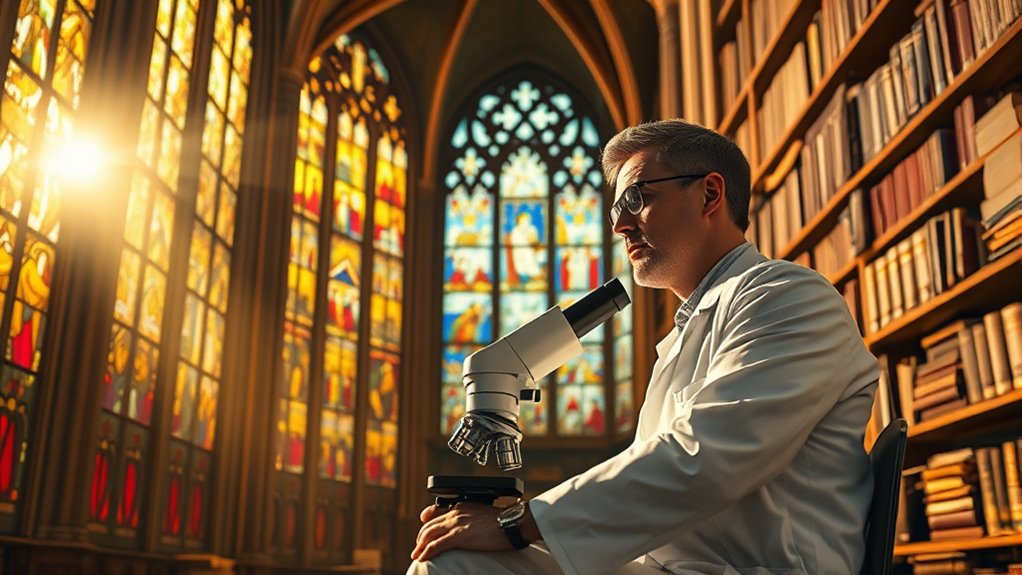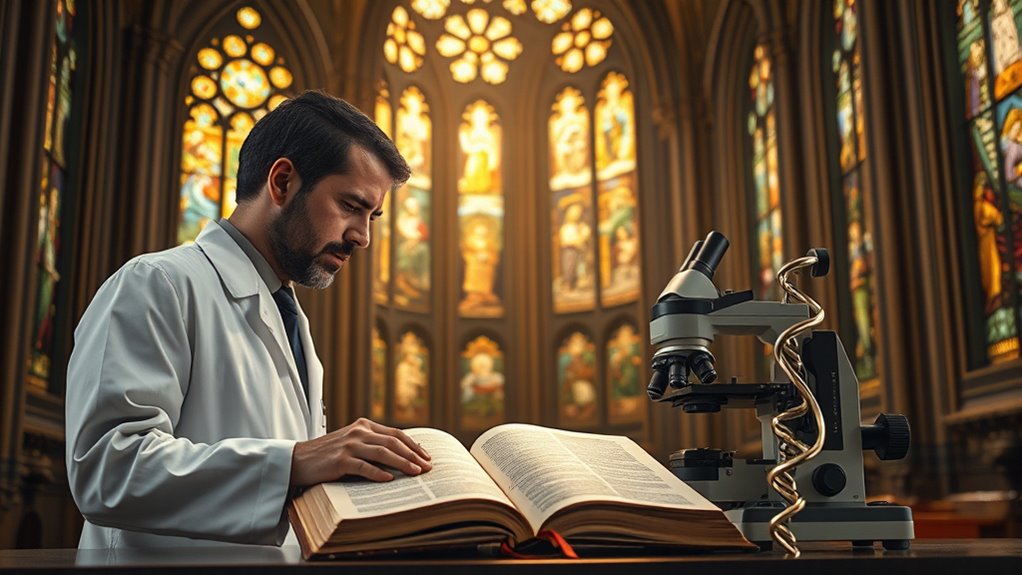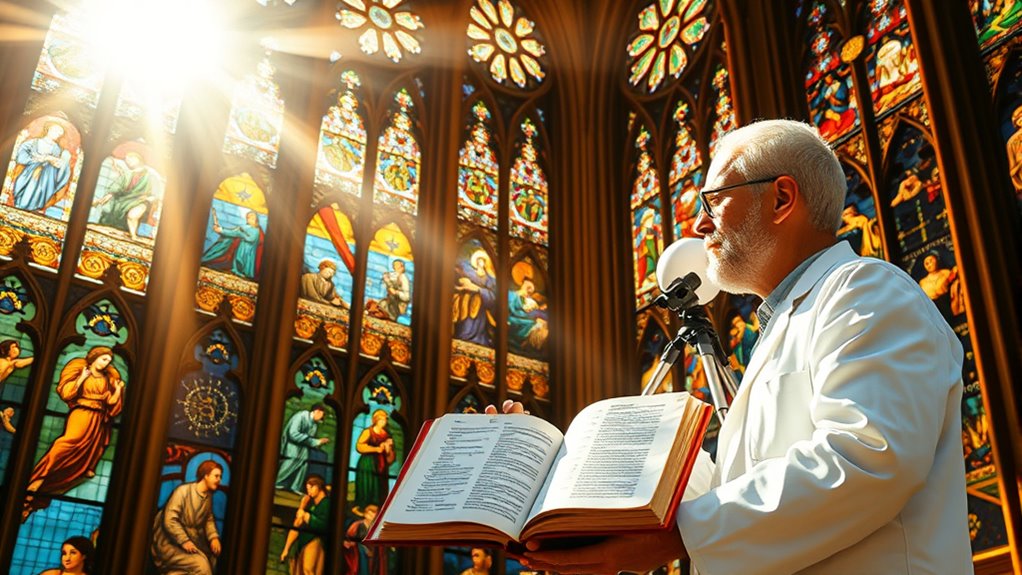Christianity and science have a complex history, involving both conflicts and collaborations. Many misconceptions suggest they are incompatible, but faith and scientific inquiry often complement each other. Religious thinkers have contributed to discoveries, and modern scientists of faith see no conflict between their beliefs and scientific research. Understanding how theology influences ethics and how faith can deepen scientific curiosity shows they can coexist harmoniously. If you continue exploring, you’ll discover more about how faith and science can work together.
Key Takeaways
- Many Christians see faith and science as complementary, addressing different questions about existence and purpose.
- Historical interactions show periods of conflict but also significant cooperation and mutual influence.
- Literal interpretations of religious texts can create conflicts with scientific findings, but symbolic readings often harmonize both.
- Scientific consensus is based on evidence and can evolve, allowing faith to coexist without threat.
- Religious beliefs have historically inspired scientific exploration and ethical frameworks, demonstrating ongoing compatibility.
Historical Interactions Between Christianity and Science

The relationship between Christianity and science has a long and complex history, shaped by both cooperation and conflict. Early on, religious thinkers contributed to scientific progress, but debates often centered on evolution and Creation narratives. For centuries, some Christian authorities challenged scientific ideas that seemed to contradict literal interpretations of scripture, especially during the age of evolution debates. These conflicts sparked fierce discussions about how to interpret sacred texts and scientific evidence, often involving scientific evidence that challenged traditional beliefs. Despite tensions, many Christians supported scientific advancement, seeing it as a way to understand God’s creation more fully. Over time, these interactions influenced how both communities approached questions about the origins of life, leading to ongoing dialogues rather than simple opposition. This history reveals a nuanced relationship rooted in both disagreement and shared curiosity, including ongoing discussions about biblical interpretation and scientific evidence. Additionally, some Christian scholars have sought to reconcile faith and science through theology, fostering a more integrated understanding of the natural world.
Common Misconceptions About Faith and Scientific Findings

Many people believe faith and scientific data are always at odds, but they often address different questions. Misunderstandings arise when literal interpretations of texts clash with scientific findings or when scientific consensus is misused to dismiss faith. Recognizing these misconceptions helps clarify how faith and science can coexist.
Faith vs. Empirical Data
People often assume that faith and science are inherently incompatible, but this misconception overlooks the nuanced relationship between the two. Faith involves trust in divine creation and sometimes includes miraculous interventions that science may not explain. These events aren’t necessarily contradictions but aspects of spiritual belief that transcend empirical data. Scientific methods rely on observable, testable facts, but they don’t dismiss the possibility of divine influence behind certain phenomena. Many scientists and believers see no conflict in acknowledging both: science explains how natural processes work, while faith addresses why they exist. Recognizing this distinction helps clarify that faith and scientific findings can coexist, each offering insights into different dimensions of reality without invalidating one another. Additionally, data analytics in AI demonstrates how information can be used to enhance understanding without undermining spiritual beliefs. This perspective underscores that scientific inquiry often complements rather than conflicts with faith-based explanations, especially when considering the interplay of science and faith. Moreover, understanding the limits of scientific explanation reveals that some aspects of existence may remain beyond empirical investigation, allowing room for spiritual interpretation. Furthermore, the role of empirical evidence in shaping scientific conclusions does not negate the spiritual significance attributed to certain phenomena.
Literal vs. Symbolic Texts
Misunderstandings often arise when interpreting religious texts alongside scientific findings, particularly regarding whether these writings should be read literally or symbolically. Many people assume that a literal reading of biblical stories conflicts with scientific understanding, but this isn’t always the case. Some interpret these stories as mythical interpretations, conveying moral or spiritual truths rather than exact historical accounts. Recognizing this distinction helps prevent unnecessary conflicts. For example, the creation story can be seen as symbolic of broader truths about origins rather than a literal timeline. Embracing a symbolic approach allows you to appreciate the rich metaphorical language used in sacred texts, fostering harmony between faith and science. Additionally, understanding that scientific discoveries often complement religious beliefs can help bridge the perceived divide between the two. This perspective encourages you to see religious writings as meaningful narratives, not necessarily in opposition to scientific discoveries. Recognizing the interpretive nature of sacred texts can further promote a balanced view that honors both spiritual and scientific insights. Moreover, many Indigenous wellness practices demonstrate how traditional knowledge can coexist with modern scientific understanding, illustrating that cultural wisdom and science can be complementary rather than conflicting. Furthermore, adopting a holistic perspective allows for a more integrated understanding of human existence, blending spiritual beliefs with empirical evidence.
Scientific Consensus Misused
While scientific consensus often guides public understanding of natural phenomena, it’s important to recognize that it can be misused to dismiss or undermine faith-based perspectives. The scientific consensus represents the collective agreement of experts based on available evidence, but some misuse of science occurs when this consensus is presented as an absolute truth or used to dismiss differing views. This misuse of science can create the false impression that faith and science are inherently incompatible, which isn’t accurate. Science evolves with new discoveries, and consensus can change. Recognizing this helps prevent misconceptions that scientific findings threaten faith. Additionally, understanding the rise of mobile apps facilitating breakfast orders illustrates how technological advancements can support diverse lifestyle choices. Recognizing the importance of space efficiency and multifunctional furniture in tiny house design demonstrates how innovative solutions can maximize limited space without sacrificing comfort. This parallel highlights how educational toys promote flexible and adaptive learning environments that can fit into various settings. Furthermore, appreciating the contrast ratio in projectors underscores how different technological specifications can influence the clarity and depth of images, much like how scientific understanding can deepen over time. By acknowledging the dynamic nature of scientific knowledge, one can better appreciate how science and faith can coexist, each addressing different questions about human existence.
How Religious Beliefs Have Influenced Scientific Discoveries

Religious beliefs have historically played a significant role in shaping scientific discoveries, often guiding researchers toward new questions and methods. Faith-driven research inspired many scientists to seek divine intervention and explore the natural world as a reflection of their faith. This motivation led to breakthroughs, such as the development of early hospitals and medical care rooted in Christian charity. Sometimes, belief in divine intervention encouraged scientists to pursue knowledge with conviction, believing their work revealed God’s creation. Additionally, the scientific method itself has been influenced by religious principles that emphasize careful observation and systematic inquiry. Here’s a look at some examples: thorough due diligence in research and funding processes has been essential to advancing scientific understanding. The historical role of religion in fostering curiosity and inquiry has contributed to the foundation of modern science. Furthermore, religious institutions often provided the necessary intellectual infrastructure that supported the growth of scientific ideas and education. Additionally, the integration of religious perspectives has sometimes facilitated collaboration and moral guidance in scientific pursuits, fostering a religious influence that continues to shape scientific ethics and priorities.
Perspectives of Modern Scientists Who Are Religious

Many modern scientists who are religious believe that faith and scientific inquiry can complement each other rather than conflict. They often see their spiritual beliefs as guiding their curiosity and ethical responsibilities in research. Understanding their perspectives helps you appreciate how faith and science can coexist harmoniously. Some also argue that scientific exploration can deepen their understanding of the divine and spiritual truths. Additionally, recognizing that well-being encompasses emotional and spiritual health can foster a more holistic view of human existence. Embracing an integrative approach allows for a richer comprehension of how scientific insights can align with religious beliefs, especially when considering how essential oils are used to promote health and healing—highlighting the potential harmony between natural remedies and spiritual wellness.
Faith and Scientific Inquiry
Have you ever wondered how scientists who are also people of faith reconcile their spiritual beliefs with their pursuit of scientific understanding? Many see no conflict, viewing miraculous phenomena and divine intervention as aspects of a larger reality beyond current scientific explanation. They believe that faith provides context for understanding the universe’s mysteries, not contradicts it. For these scientists, scientific inquiry is a way to explore creation, while their faith offers meaning and purpose. They often see divine intervention as rare, extraordinary events that science can’t fully explain yet, but that don’t undermine natural laws. Instead, they view science and faith as different tools—one explaining how, the other why—working together to deepen their understanding of existence.
Religious Scientists’ Views
Modern scientists who are also people of faith often see their spiritual beliefs as compatible with their scientific work, viewing both as pathways to understanding the universe. Many of these scientists participate in faith debates, emphasizing that science and religion address different questions. They argue that religious dogma doesn’t need to conflict with scientific discoveries, viewing faith as a personal foundation rather than a barrier to scientific progress. These scientists believe that acknowledging their faith enriches their work, providing moral guidance and a sense of purpose. They often challenge the misconception that faith and science are inherently opposed, instead highlighting examples where their beliefs motivate a deeper curiosity about creation. Their perspectives demonstrate that being religious doesn’t mean rejecting scientific inquiry but can complement it.
The Role of Theology in Scientific Ethics and Morality

Theology has historically played a crucial role in shaping ethical standards and moral principles within scientific practice. You can see this influence in how moral dilemmas are addressed through theological ethics, guiding scientists in making morally sound decisions. Religious teachings often provide a moral framework that influences research priorities, bioethics, and debates over controversial topics like cloning or stem cell research. By grounding ethical considerations in theological ethics, scientists and practitioners gain a moral compass rooted in shared values and spiritual principles. This interplay helps guarantee that scientific progress aligns with moral responsibilities, emphasizing compassion, integrity, and respect for human dignity. Ultimately, theology offers a foundation for steering complex ethical questions that arise as science advances.
Finding Harmony: Examples of Faith and Science Working Together

Throughout history, faith and science have often worked side by side to address some of humanity’s most pressing challenges. For example, during the evolution debates, many scientists and religious thinkers found common ground by exploring how scientific discoveries about natural selection can complement creation narratives. Some faith communities interpret their scriptures metaphorically, seeing no conflict with evolutionary theory. Others support scientific research while maintaining their spiritual beliefs. Prominent figures have demonstrated that faith and science can collaborate, fostering a dialogue rather than opposition. This harmony shows that understanding different perspectives enriches both fields. By embracing this coexistence, you can see how faith and science contribute jointly to a deeper understanding of the universe and humanity’s place within it.
Frequently Asked Questions
Can Religious Beliefs Be Proven or Disproven by Scientific Methods?
When you ask if religious beliefs can be proven or disproven by science, you’re touching on faith verification and belief falsifiability. Scientific methods rely on evidence and testability, which often don’t apply to faith-based claims. So, you can’t truly verify or falsify religious beliefs through science because they rest on personal faith rather than empirical evidence. This distinction highlights why faith and science serve different purposes in understanding the world.
How Do Different Christian Denominations View Scientific Theories Like Evolution?
Diverse denominations debate about scientific theories like evolution, demonstrating doctrinal differences. Some, emphasizing biblical literalism, see evolution as incompatible with scripture, resisting scientific consensus. Others embrace denominational diversity, accepting evolution as compatible with faith, viewing scripture metaphorically. You’ll find a spectrum of perspectives, from strict literalism to flexible interpretation, showing how Christian denominations navigate science and scripture. This dynamic dialogue highlights the ongoing intersection of faith, fact, and interpretation.
What Are Some Examples of Conflicts Between Christianity and Science in History?
You see, throughout history, conflicts arose when people held literal interpretations of religious texts, viewing myths as factual truths. For example, the Galileo affair challenged the church’s stance on heliocentrism, while the debate over creationism versus evolution highlights clashes between myth versus fact. These conflicts often stemmed from refusing to reconcile scientific discoveries with strict biblical literalism, fueling debates about the relationship between faith and scientific understanding.
Do Religious Scientists Face Challenges Integrating Faith and Research?
Like Galileo facing skepticism, you might find that faith and skepticism challenge your research. Religious scientists often navigate the delicate balance of doctrine and evidence, seeking harmony between belief and discovery. You may encounter doubts from peers or internal conflicts, but perseverance helps you integrate faith with scientific inquiry. Embracing both can deepen understanding, showing that faith and science can coexist rather than conflict, enriching your pursuit of truth.
How Does Christianity Interpret Scientific Discoveries About the Universe’s Origins?
You see that Christianity interprets scientific discoveries about cosmic creation through the lens of divine intervention. Many believe that scientific explanations, like the Big Bang, reveal how God’s power brought the universe into existence. You might view these discoveries as complementing faith, illustrating God’s ongoing role in creation. Christianity often sees science and faith as different ways to understand the same divine plan, emphasizing harmony rather than conflict.
Conclusion
You might be surprised to learn that around 40% of scientists today identify as religious, showing that faith and science can coexist. Instead of conflicting, they often complement each other, enriching your understanding of the universe. By exploring their historical ties and modern examples, you see that science and Christianity can work together to deepen moral insights and ethical decision-making. Embracing both can lead to a fuller, more meaningful perspective on life and discovery.










